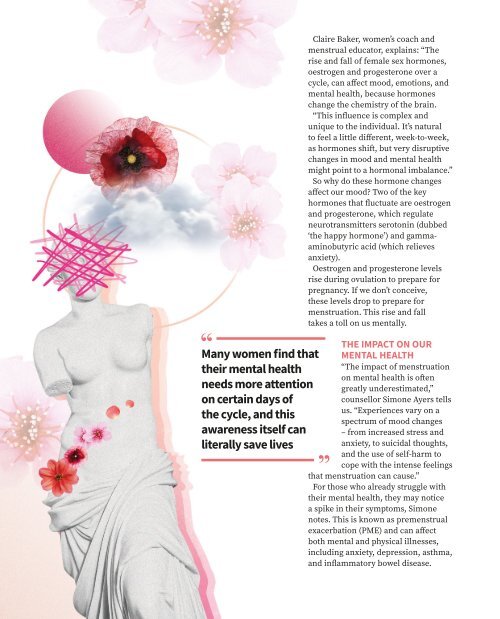Happiful August 2019
You also want an ePaper? Increase the reach of your titles
YUMPU automatically turns print PDFs into web optimized ePapers that Google loves.
Many women find that<br />
their mental health<br />
needs more attention<br />
on certain days of<br />
the cycle, and this<br />
awareness itself can<br />
literally save lives<br />
Claire Baker, women’s coach and<br />
menstrual educator, explains: “The<br />
rise and fall of female sex hormones,<br />
oestrogen and progesterone over a<br />
cycle, can affect mood, emotions, and<br />
mental health, because hormones<br />
change the chemistry of the brain.<br />
“This influence is complex and<br />
unique to the individual. It’s natural<br />
to feel a little different, week-to-week,<br />
as hormones shift, but very disruptive<br />
changes in mood and mental health<br />
might point to a hormonal imbalance.”<br />
So why do these hormone changes<br />
affect our mood? Two of the key<br />
hormones that fluctuate are oestrogen<br />
and progesterone, which regulate<br />
neurotransmitters serotonin (dubbed<br />
‘the happy hormone’) and gammaaminobutyric<br />
acid (which relieves<br />
anxiety).<br />
Oestrogen and progesterone levels<br />
rise during ovulation to prepare for<br />
pregnancy. If we don’t conceive,<br />
these levels drop to prepare for<br />
menstruation. This rise and fall<br />
takes a toll on us mentally.<br />
THE IMPACT ON OUR<br />
MENTAL HEALTH<br />
“The impact of menstruation<br />
on mental health is often<br />
greatly underestimated,”<br />
counsellor Simone Ayers tells<br />
us. “Experiences vary on a<br />
spectrum of mood changes<br />
– from increased stress and<br />
anxiety, to suicidal thoughts,<br />
and the use of self-harm to<br />
cope with the intense feelings<br />
that menstruation can cause.”<br />
For those who already struggle with<br />
their mental health, they may notice<br />
a spike in their symptoms, Simone<br />
notes. This is known as premenstrual<br />
exacerbation (PME) and can affect<br />
both mental and physical illnesses,<br />
including anxiety, depression, asthma,<br />
and inflammatory bowel disease.<br />
46 • happiful.com • July <strong>2019</strong>

















